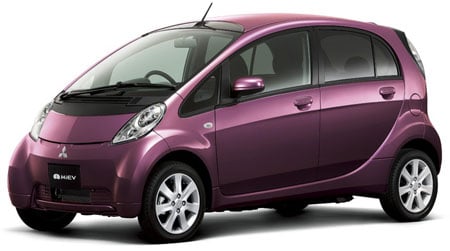 The Mitsubishi i MiEV (MiEV is an acronym for Mitsubishi innovative Electric Vehicle) is a five-door hatchback electric car produced by Mitsubishi Motors. According to the manufacturer, the i MiEV all-electric range is 100 miles (160 km) on the Japanese test cycle and 75 miles (121 km) on the US cycle.
The Mitsubishi i MiEV (MiEV is an acronym for Mitsubishi innovative Electric Vehicle) is a five-door hatchback electric car produced by Mitsubishi Motors. According to the manufacturer, the i MiEV all-electric range is 100 miles (160 km) on the Japanese test cycle and 75 miles (121 km) on the US cycle.Mitsubishi i MiEV, based on the Mitsubishi i kei car, was first exhibited at the 22nd International Battery, Hybrid and Fuel Cell Electric Vehicle Symposium & Exposition in Yokohama. Mitsubishi eschews the in-wheel motors (MIEV) in favour of a more conventional array of batteries, motor and inverter to replace the "rear midship" engine and fuel tank of the conventional car. Mitsubishi Motors provided three power companies with vehicles in 2006 and 2007 in order to conduct joint research to evaluate how fast-charge infrastructure may be developed for EVs. Fleet testing by five power companies was conducted in 2007. The car had a range of 130 kilometres (80 mi) for the 16 kW·h lithium-ion pack and 160 kilometres (100 mi) for the 20 kW·h pack. Top speed was 130 kilometres per hour (80 mph).Plans were announced in 2008 to sell the i MiEV in European markets as the Peugeot iOn and Citroën C-ZERO.
The production version of the 2009 i MiEV has a single permanent magnet synchronous motor mounted on the rear axle with a power output of 47 kW and torque output 180 N·m. The vehicle uses a single-speed reduction gear transmission and has a 16 kWh lithium-ion battery pack.The car's top speed is 130 kilometres per hour (80 mph).
The 16 kWh lithium-ion battery pack that consists of 88 cells is placed under the base floor. The pack has 22 cell modules connected in series at the nominal voltage of 330 V. There are two 4-cell modules placed vertically at the center of the pack and 10 8-cell modules placed horizontally. It is developed by Mitsubishi and GS Yuasa for both high specific energy and high rate discharge and manufactured by Lithium Energy Japan, a joint venture of GS Yuasa Corporation, Mitsubishi Corporation and Mitsubishi Motors Corporation. The entire pack has a specific energy of 80 Wh/kg.
In the aftermath of the 2011 Tōhoku earthquake and tsunami, Mitsubishi announced that the company decided to introduce one year ahead of schedule a device that enables the i-MiEV to supply power to home electric appliances in the event of a power outage or natural disasters. The device provides 100-volt outlets, converting the i MiEV's direct current (DC) battery power into 100 volts alternating current (AC) to power up to 1,500 watts, which is enough to power most home electronics such as a basic rice cooker, a small heater, or any number of cellphones, laptops and radios. Mitsubishi estimates that the i MiEV total battery capacity is enough to provide nearly 1.5 days of power to an average Japanese home. The device will be available by the end of 2011.
 Production of the left-hand drive European-spec i-MiEV began in October 2010 and production of the North American-spec i-MiEV is scheduled for fiscal year 2011.[24][25] By the end of November 2010 cumulative production had reached 5,000 units at Mitsubitshi's Mizushima Plant.[24] In May 2011 Mitsubishi announced a new production target of 25,000 i-MiEVs worldwide in fiscal year 2011. The carmaker also plans to export about 15,000 units overseas, mainly to Europe, where the company will promote sales to the European public sector, such as police departments and local governments.
Production of the left-hand drive European-spec i-MiEV began in October 2010 and production of the North American-spec i-MiEV is scheduled for fiscal year 2011.[24][25] By the end of November 2010 cumulative production had reached 5,000 units at Mitsubitshi's Mizushima Plant.[24] In May 2011 Mitsubishi announced a new production target of 25,000 i-MiEVs worldwide in fiscal year 2011. The carmaker also plans to export about 15,000 units overseas, mainly to Europe, where the company will promote sales to the European public sector, such as police departments and local governments."2009 Japan Automotive Hall of Fame Car Technology of the Year" award in October 2009.
"Japanese Car of the Year Most Advanced Technology" awarded during the 41st Tokyo Motor Show in October 2009.
"Ecobest 2009" by AUTOBEST in January 2010.
"Environment Special Grand Prize" awarded during the 25th International Automobile Festival, Paris, France on February 2010.
The i MiEV was one of the five finalists to the 2011 Green Car Vision Award.





No comments:
Post a Comment